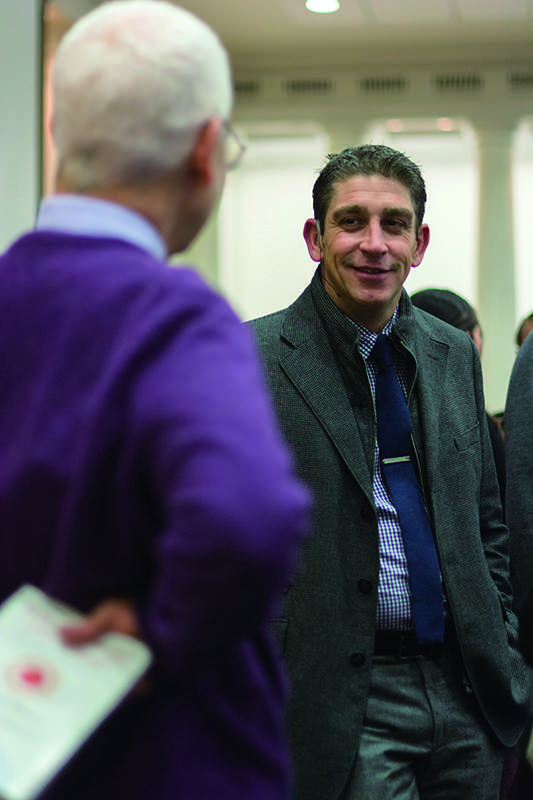Poet discusses heritage, speaking at Obama’s inauguration
Brian Lee/Daily Senior Staffer
Poet Richard Blanco chats with University President Schapiro before his presentation Tuesday afternoon. Blanco, who read at President Barack Obama’s second inauguration, read several poems in between describing the influence of his immigrant upbringing and sexuality on his work and discussing his work.
February 25, 2014
Richard Blanco, the first gay, immigrant and Latino poet to read at a presidential inauguration, spoke Tuesday at Northwestern about his personal journey and his beliefs on the role of poetry in public life.
A crowd of faculty, administrators and students nearly filled Harris Hall for the “Poetry for the People” event, which was organized by The Graduate School and NU’s Society of Presidential Fellows as part of a speaker series.
Blanco, the son of Cuban exiles who moved to Florida, earned his bachelor’s degree in engineering and a master’s degree in creative writing from Florida International University. He composed and performed “One Today,” a poem about the nation’s unity, for President Barack Obama’s second inauguration in January 2013.
Dwight McBride, TGS dean and associate provost for graduate education, introduced the speaker, who drew laughs with his opening remarks.
“I feel wonderful,” Blanco said. “You guys have been the most welcoming. I hope we can laugh a little bit today, cry a little bit today, possibly get in a little salsa, who knows?”
Throughout his 90-minute talk, Blanco gave a detailed description of his “road to the podium.” He spoke a great deal about his childhood, his relationship with his mother, his sexuality and his connection with America, which he said is growing stronger.
“Even though it’s a personal story, it’s also universal,” Blanco said. “Art is by nature public. Artists offer their lives as testimony so that others might connect.”
Blanco read a handful of original poems to supplement his story, including “Mother Country,” “Papa’s Bridge,” and “Queer Theory, According to my Grandmother.”
A short question-and-answer session was held at the end of the event, in which Blanco took questions concerning the spread of poetry into society. He described the primary school-level teaching of poetry as “backwards.”
“In the objective-natured classroom, teachers don’t necessarily allow for intense subjectivity or the linking of personal stories to the poetry at hand,” Blanco said. “If students are able to relate a poem to a relative or an experience, that allows for them to better understand the importance and the impact of poetry.”
Mark Huntington, a graduate student and a first-year Presidential Fellow, said Blanco was the perfect choice to help kick off the group’s speaker series.
“The Presidential Fellows are a conglomerate of students with very different academic interests. As a fellowship, we share our research with each other to help expand our academic horizons,” Huntington said. “Richard Blanco is the intersection of a lot of different interests and definitely emulates what the fellowship stands for.”
Weinberg senior Carly Blumenfeld said she thought Blanco’s perspective on the importance of poetry in society was refreshing.
“He has a really unique view on lots of aspects of life that many of us wouldn’t take into account otherwise,” she said. “It’s really fitting that he’s leading the forefront of making poetry more relevant.”



